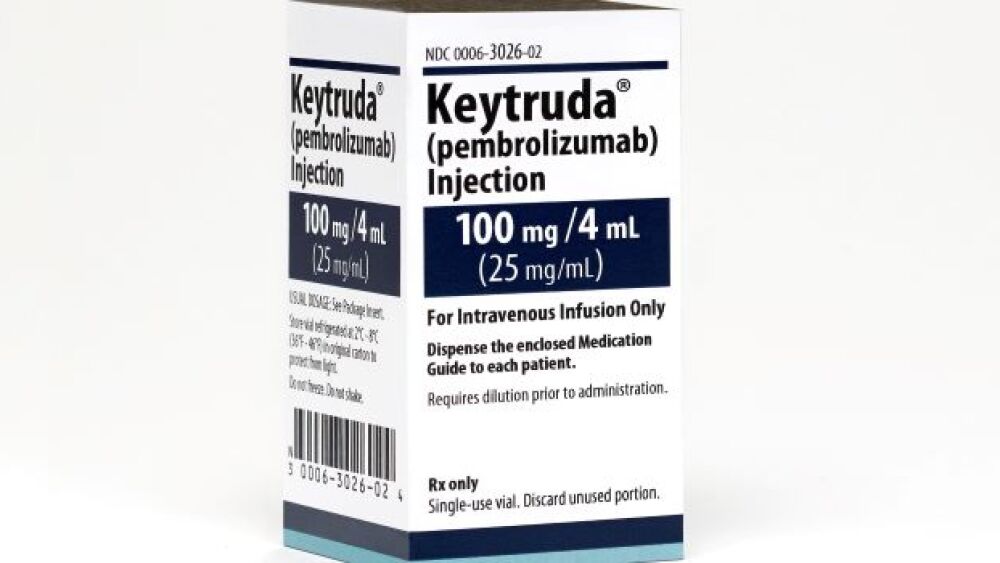New data presented at the IASLC 2020 North America Conference on Lung Cancer shows a combination of Keytruda with other medications has a positive impact on non-small cell lung cancer.
Copyright © 2009-2020 Merck Sharp & Dohme Corp., a subsidiary of Merck & Co., Inc., Kenilworth, N.J., U.S.A. All rights reserved.
Merck’s checkpoint inhibitor Keytruda continues to show its efficacy in treating types of lung cancer and extending the life expectancy of some patients. New data presented at the IASLC 2020 North America Conference on Lung Cancer shows a combination of Keytruda with other medications has a positive impact on non-small cell lung cancer.
At the conference, Merck pointed to a specific cohort of the KEYNOTE-021 study to demonstrate the drug’s abilities. Patients in Cohort G had no EGFR or ALK genomic tumor aberrations. For those patients, Keytruda, an anti-PD-1 therapy, in combination with chemotherapy demonstrated a significant improvement in objective response rates (ORR), progression-free survival and also a sustained long-term survival benefit in patients with advanced nonsquamous non-small cell lung cancer regardless of PD-1 expression compared to chemotherapy alone. Findings from Cohort G in this study showed that 50% of patients treated with Keytruda in combination with chemotherapy were alive at three years versus 37% of patients who received chemotherapy alone. The combination treatment also reduced the risk of death by 29% with a median overall survival (OS) of 34.5 versus 21.1 months, Merck said. Objective response rate was 58% for the Keytruda combination compared to 33% for chemotherapy alone.
Three year data showed the vast majority of patients (92%) in the study who were treated with Keytruda for two years were still living at the time the data was recorded. These three-year findings represent the longest follow-up data for an anti-PD-1/PD‑L1 therapy in combination with chemotherapy for the first-line treatment of NSCLC, Merck said. The median duration of response was more than one year longer for Keytruda versus chemotherapy alone. Additionally, 51% of patients treated with Keytruda in combination with chemotherapy had responses lasting three years versus 47% with chemotherapy alone, Merck reported.
Non-small cell lung cancer is the most common type of lung cancer, accounting for about 85% of all cases. Lung cancer can also be characterized by the presence of different biomarkers, including PD-L1, KRAS, ALK, EGFR and ROS1.
Additionally, Merck presented updated follow-up data from a Phase I/II study of Keytruda in combination with quavonlimab, the company’s novel investigational anti-CTLA-4 antibody, showed encouraging anti-tumor activity and an acceptable safety profile as first-line treatment in patients with advanced NSCLC. The updated data from this Phase I/II study will lay the foundation for a planned Phase III study of this combination therapy for advanced non-small cell lung cancer, Vicki Goodman, vice president of oncology clinical research at Merck Research Laboratories, said in a statement.
“Over the last five years, Keytruda has become foundational in the treatment of metastatic lung cancer. The long-term data from KEYNOTE-021 reinforce the use of Keytruda in combination with chemotherapy in certain advanced lung cancer patients, while data from our oncology pipeline reflect our commitment to exploring a number of new combinations with Keytruda that we believe could have a meaningful impact for more lung cancer patients,” Goodman said in a statement.
In the Phase I/II study, the combination of Keytruda and quavonlimab was assessed as a first-line treatment in patients with advanced NSCLC. The primary objective of the Phase I/II study safety and tolerability; secondary and exploratory objectives included ORR, PFS, OS and DOR. Responses to the combination treatment were observed regardless of PD-L1 expression with higher tumor proportion scores significantly associated with better response, Merck said. Study findings showed an acceptable safety profile for the combination therapy.
Since it was first approved by the U.S. Food and Drug Administration, Keytruda has become a cornerstone of Merck’s oncology pipeline. Keytruda has been approved more than 22 times since 2015. The medication is slated to become the world’s top-selling drug by 2025, according to analyst predictions.





